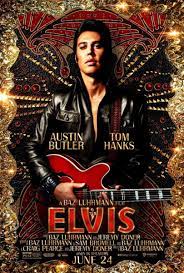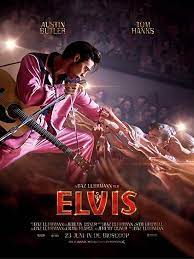ELVIS: MUSIC, POLITICS, AND VILLAINS
Elvis:
As a preface, my understanding of Elvis Presley’s life, beliefs, and career are confined to the 2022 Baz Luhrman movie. Thus, all of my comments reflect the chronology and story of the film which I can only assume took creative liberties.
Elvis was a lot tamer than I thought it was going to be. Initial reviews from critics and audiences alike commented on how insane the movie was in terms of visuals, audio, and acting. To be fair, Elvis is a movie unafraid to take creative risks, but having seen two of Luhrman’s other movies (Moulin Rouge and Romeo + Juliet) I did feel that Elvis was considerably more restrained. Furthermore, to the people critiquing the spectacle of the movie, I feel the need to ask: Would the story of Elvis Presley, a man defined in pop-culture by his larger-than-life persona, work without the intensity? What would be the point of telling the Elvis story if there was no focus on the absurdity and luxury of it all?
So is the movie out there? Yes.
Was Luhrman a great director for the project? Also yes.

I was not captivated by Elvis before the first trailer came out. I did not grow up listening to his music or watching his movies, and I thought of him as a relic of the past- unobtrusive and bland. It wasn’t until the end of the trailer, when Presley’s cover of ‘Unchained Melody’ started playing, that I became interested-realizing the movie intended to cover not only Elvis’ life, but the politics of the era he lived in.
Elvis is the story of Elvis Presley (Austin Butler) from his childhood to his death, and it specifically focuses on the relationship between Elvis and his manager, Colonel Tom Parker (Tom Hanks). The first half of the movie is centered on Elvis’ meteoric rise in popularity, as well as his marriage to Priscilla Wagner (Olivia DeJonge) and the birth of his daughter Lisa Marie. The first half culminates in his career revival by way of the ‘68 Comeback Special (when Elvis is 33), which takes place shortly after the assassination of Martin Luther King Jr. and Robert Kennedy. The second half is significantly darker in tone, showing the gradual decline of Elvis’ career and personal life as rock ‘n roll changes, his vices become addictions, and his relationships deteriorate. However, the movie does not end with Elvis’ death, but rather with the death of Parker- who narrates the entire movie.
The film itself feels like one long and engaging music video. Nearly every scene is underscored with a Presley tune, a cover of a Presley tune, or a new song that samples an Elvis one. It is the music that gives the movie its dynamic energy, and that acts as the heart and soul of the project. Even more than a visual feast, it is an audio one.
Each time a musical number started, there was anticipation and excitement. Luhrman let these performances be drawn out, allowing the audience to enjoy entire songs and breaks from dialogue. Often, the movie uses conventions of the movie musical and has the songs convey important plot or serve as a look into the mind of the characters- especially near the end of the movie with reprises of songs like ‘Are You Lonesome Tonight?’
The editing choices only further the impact, giving the movie the feel of a real broadcast performance or a real stage performance. Intercutting news headlines and commentary over the musical numbers also tie Elvis’ life to the politics of his lifetime, specifically racism and segregation.
Elvis represents the emergence of a new teen culture and social change. Parker focuses on Elvis’ appearance, the fact that he wears pink, his longer hair, his makeup- all things that ostracize him from upper class white society, and traditional views of masculinity. Further, rock ‘n roll was created by Black artists, which intensifies white audiences’ wariness. However, when his teenage fan base grows- and eventually his adult audience as well- Elvis is now representative of generational conflict. The movie makes a great case for how Elvis made ripples, showing him as a symbol of rebellion- disproving my perception of him.

Butler more than sells the part, not only holding his own against Hanks, but effectively carrying the movie in scenes that are completely charisma and character driven. Notably, his performance of ‘Trouble’ in the early part of the movie, and ‘If I Can Dream’ stand out, anchoring the character while also exemplifying what made him a legendary performer. Additionally, Butler gives gravity to the quiet scenes of the movie, communicating grief and regret nonverbally. This performance creates a stark contrast between the glitz that Elvis performed in, and the quiet personal life that was hidden away.
The only thing Butler’s performance can’t save is the questionable decisions of the character. It’s reasonable to assume that anyone interesting enough to have their own biopic has done both incredible and reprehensible things. For Elvis, there is a lurking theme of cultural appropriation, as Elvis profits from the music of Black artists who will never receive the same financial gain- a fact that B.B. King (Kelvin Harrison Jr.) points out. However, Elvis’ relationship and responsibility to rock ‘n roll and its origins in rhythm and blues are not deeply discussed. Later, it also becomes apparent that Elvis has been serially cheating on Priscilla (this is not the only worrying part of their relationship as the movie eludes to Priscilla having been a teenager when the pair met) but Priscilla doesn’t seem to mind, nor does the narrative. The movie takes this glossing over even further by framing Parker as the villain of the narrative.
Elvis’ worst moments are always directly compared to that of Parker, whose blatant exploitation and manipulation of Elvis is clear from the opening. Parker is the one who exposes Elvis to, and creates his reliance on, medication. Parker is the one who controls Elvis’ public persona and his performance venues. It is also Parker who controls all merchandising and licensing rights, and Parker is the one who traps him in a predatory contract in Las Vegas (Spoiler alert- the reason for this being that Parker is an illegal immigrant from the Netherlands-Spoiler ends). Therefore, anything that would make the audience question Elvis’ motivations or the ethics of his actions are pushed to the side with the reminder that he isn’t the villain of the story- Parker is.
In doing this, Elvis is sometimes stripped of narrative agency, which becomes apparent during the end of the film and Parker’s final monologue. Parker makes the claim that Elvis’ death was not caused by a heart attack, but rather by his undying love for audiences and his inability to take a step back. This theme, while interesting, both directly contradicts the existence of the movie, and does not fit in with the other morals of the film. More accurately, the movie is about how unhealthy relationships, especially those established early, create cycles of imbalance that are difficult to break away from. What would have happened if Elvis had been established when he met Parker? What would have happened if Elvis met Priscilla when they were older? Started his career when he was older? What are the ramifications of a young man being the subject of so much attention? These questions are given answers, but never satisfactory ones.
Despite this, the ultimate narrative and creativity of the movie is impossible to deny, and it is well worth the watch. The strong performances, editing, and music sequences make it a unique viewing experience that will leave the audience thinking and talking about it for the coming weeks. And even if the movie doesn’t stick with you- the soundtrack certainly will.
8.5/10 would wear a bright pink suit again
Further breakdown:
Writing Quality: 8/10 Enjoyability: 9/10
Pace: 9/10 Visual elements: 10/10
Plot development: 8/10 Insightfulness: 8/10
Characters: 9/10





